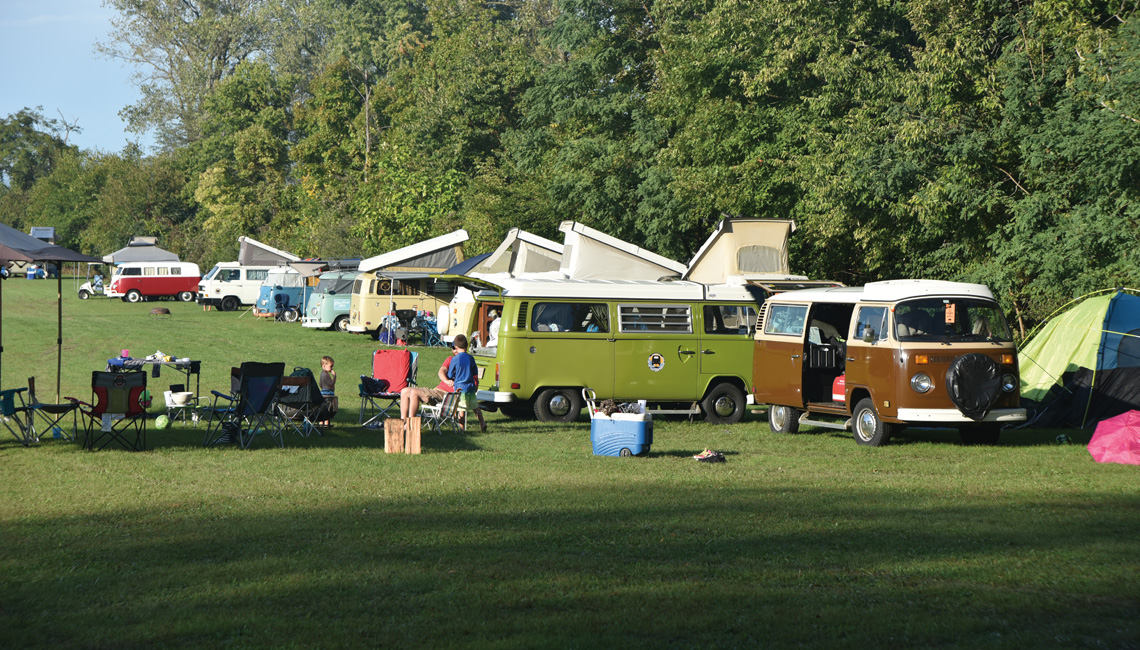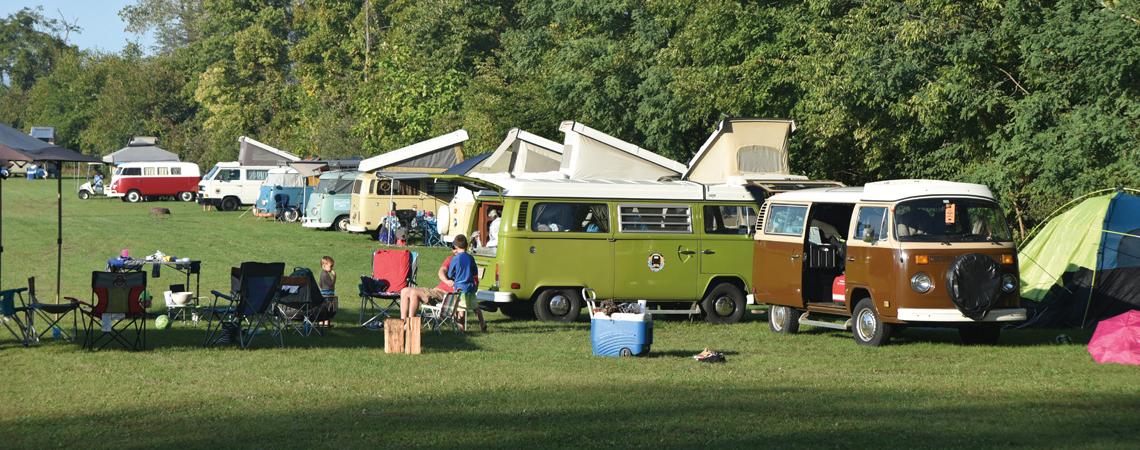Love of kombi is an affliction that runs deep and can span decades — ask anyone who suffers. Specifically, ask those who assemble at the Kelleys Island 4-H campground each autumn for LEAKOIL’s annual weekend camping event, Kombis on Kelleys. LEAKOIL invites its members and other owners of classic Volkswagen buses to gather, gawk, and gush over the classic cultural icons often associated with road-tripping, hippies, and the peace movement. This year’s event will be Oct. 7–9.
“I was one of the first ones coming here 20-plus years ago when we camped at the state park,” says Columbus resident Brett Esquivel, though she notes that marriage and children interrupted for a while. “Two years ago was my first time back here camping, and I brought my 14-year-old daughter. She just loved it.”
LEAKOIL stands for Lake Erie Area Kombi Owners Involvement Group, and “kombi” is short for the German word kombinationkraftswagen, or roughly translated, station wagon.
LEAKOIL invites its members and other owners of classic Volkswagen buses to gather, gawk, and gush over the classic cultural icons often associated with road-tripping, hippies, and the peace movement.
Esquivel said there are disadvantages to owning an old bus, including the “old rust-bucket” itself (as she describes her 1972 camper) and the constant attention it requires.
“People are always saying, ‘I love your car!’ and ‘Can I look inside?’” she says. “Of course, I always let them. And people offer to buy it all the time, too, but I would never sell it.”
After a small family kerfuffle, she acquired the vintage bus from a sibling in 1997 for the price of its set of new tires. Then it sat at her suburban Columbus home, moving only on rare jaunts around the neighborhood before another kerfuffle, this time with her homeowners association. As a result, it was towed, extensively repaired, plated, and joyfully returned to the road.
Esquivel’s friend Kathy Kern, also from Columbus, has a 1968 kombi, which she went to great lengths to own — all the way across the country, actually. She spoke of it fondly as she stood among a convoy of VW kombis waiting for the ferry at last year’s event.
“We flew out to California before the internet, and bought it from one of the old Auto Trader magazines. Got it from the original owner,” she said with a lilt of satisfaction in her voice. “Then we drove it home.”
An apparent prerequisite to bus ownership is the willingness to display endearing decals; Kern’s bus has one that reads: “0 to 60 in 5 minutes.”
“My mechanic made me put that on there and, well, it’s the truth,” she chuckles. “It’s to let the guy behind me know to not be in a hurry, because we’re not going anywhere fast.”
The official LEAKOIL logo, in fact, features a bus dripping oil. When asked about mechanical issues, Kern interrupts.
“All the time,” she says with a laugh. “Last year we didn’t make it here with the bus, we broke down in New Washington. That’s why I travel in a group — so if it breaks down, there are people to work on it. In fact, there’s a book that lists an entire network of people across the U.S. that will help you repair Volkswagens.”
Fortunately, Kern did in fact make it to Kelleys — but without the bus; she just parked it, hopped in a friend’s bus, and kept heading north. Her van was repaired by the time the campout was over, and she drove it back home.
Port Clinton resident Craig Stephens had his 1964 split-window bus at the event — “split,” meaning the windshield is two pieces of glass instead of a single wrap-around. Only pre-1968 buses feature the two-pane windows, and such owners consider themselves lucky.
“A split would be the most sought-after out of the buses here,” he says. “In general, the split window’s the coolest bus. It’s also true that it’s not ‘if’ it’s going to break down, it’s ‘when’ it’s going to break down. Because it’s going to break down, and that’s why you carry tools.”
Despite the fact that Stephens’ van is a coveted “splittie,” it is not loved by all. “My wife’s not a fan of it,” he says. “Her idea of camping is on the fifth floor at the Hilton.”
But Kathy Kern says that there’s not really a pecking order among the bus crowd.
“No, they’re all loved by everyone,” she says. “We’re one big family and I’m sure everyone here would be more than willing to talk to you about their bus. Trust me.”
The lowdown:
- Official name: VW Transporter
- In production since 1950
- Air-cooled four-cylinder engine
- Earlier versions top speed: 60
- 1968 sticker price: $2,765
- 2022
Low retail: $18,700
Avg. retail: $41,400
High retail: $74,900
(JD Power) - Over 13 million sold worldwide










